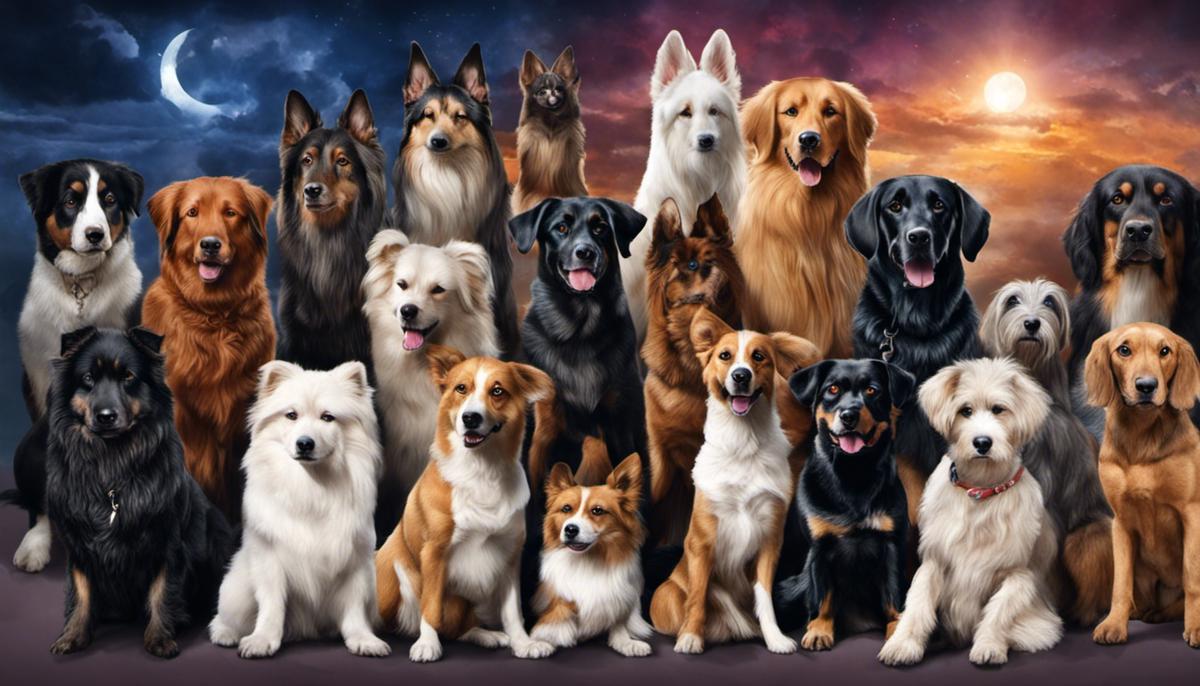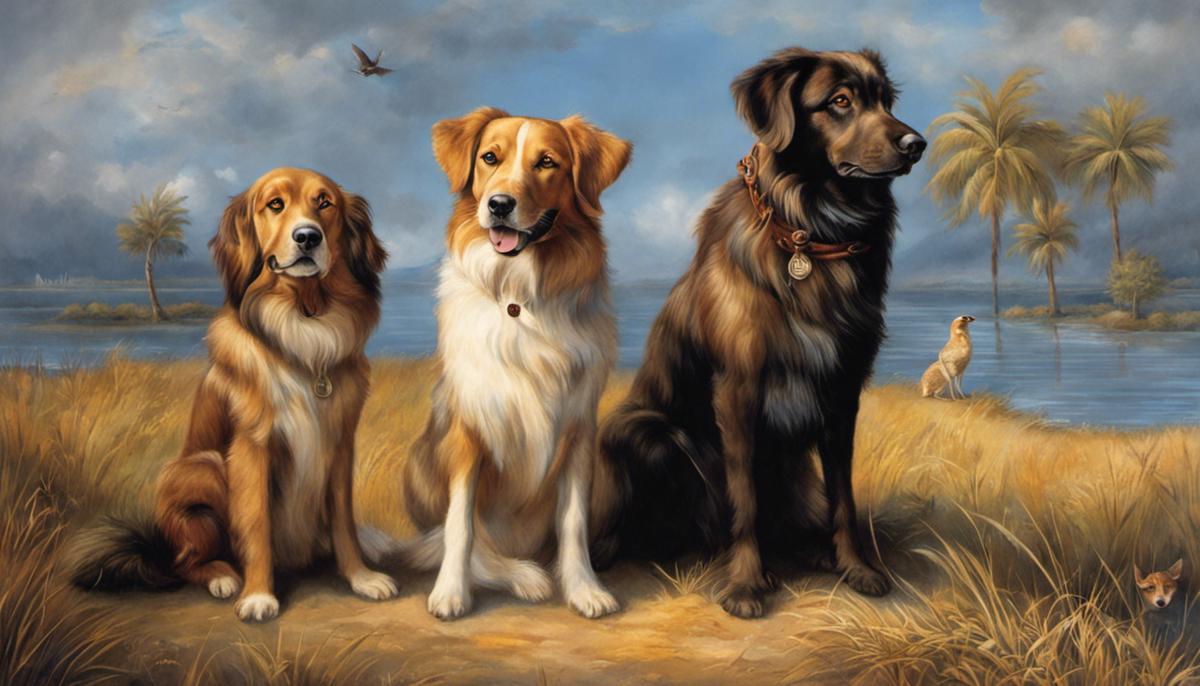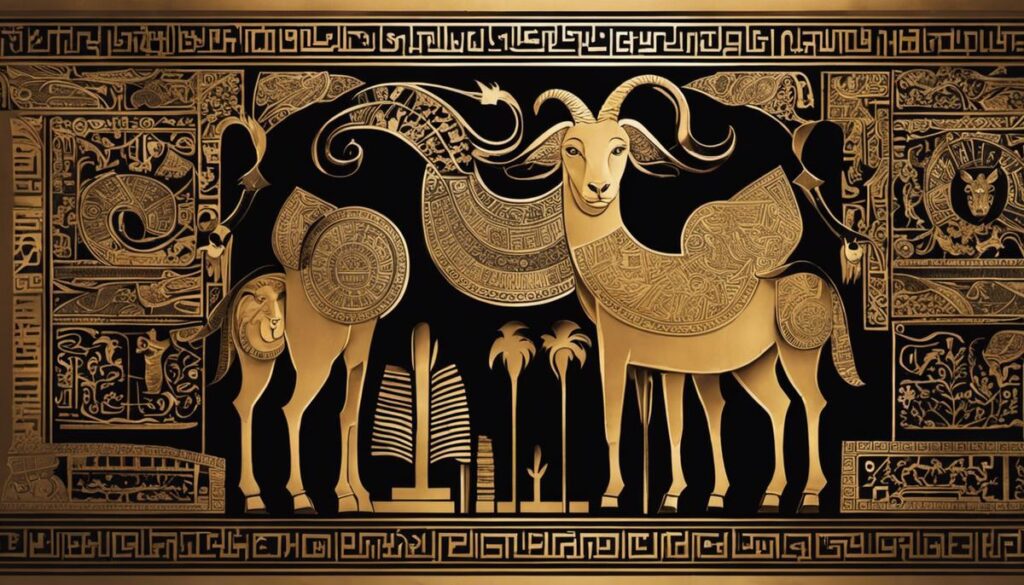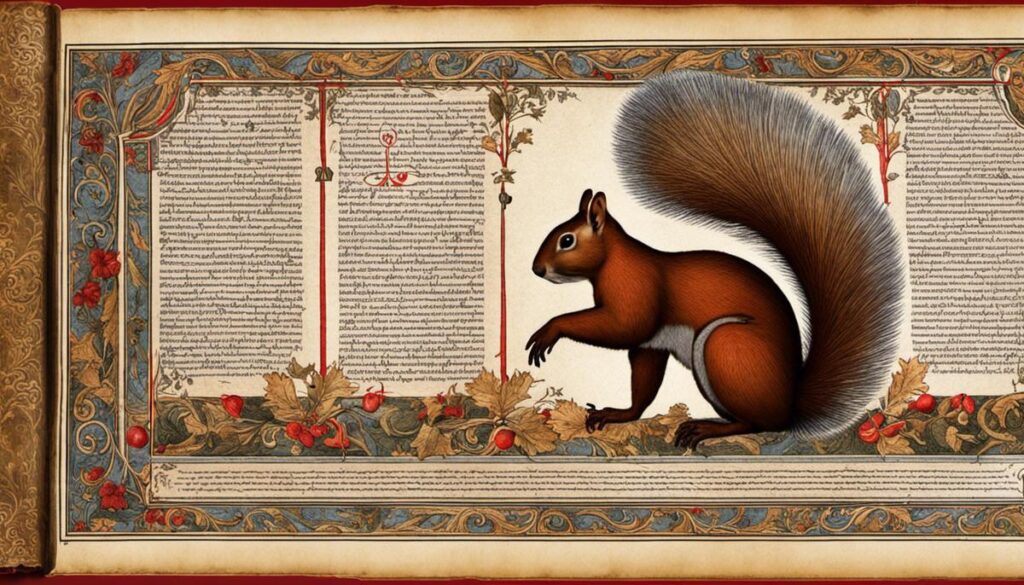Within the vast tapestry of religious and cultural interpretation, the symbolism of dogs in dreams holds a distinct and unique fascination. Woven throughout historical accounts, chapters of wisdom, and psychological exploration, these images carry nuanced implication based on biblical teachings. Grasping the depth of these interpretations requires us to traverse the historical significance of dogs within biblical narratives, journey into the realms of these dreams’ symbolism from a biblical perspective, understand the influences of cultural aspects on these interpretations, and explore the intriguing interplay between psychological and spiritual factors in dream analysis.
Historical Significance of Dogs in Bible
The topic of dogs within biblical literature is a fascinating one, brimming with nuanced interpretations and cultural contexts. Dogs, one of humanity’s earliest domesticated animals, possess a representation surprisingly complex and multifaceted within this historical body of text. The exploration starts with an understanding of how dogs were viewed in ancient near-eastern societies, the cradle of biblical literature.
In ancient Israel and its surrounding cultures, unlike today’s Western world, dogs were often perceived as impure creatures, associated with scavenging and uncleanliness. This theme consistently surfaces in the biblical text. Dogs are frequently mentioned but rarely in a positive light. For instance, in the Book of Kings (1 Kings 14:11, 16:4, and 21:24), dogs are depicted as consuming the bodies of the deceased—a depiction that emphasizes the disgrace and desolation.
However, this is not to infer that the biblical literature unanimously portrays dogs in a negative light. On occasions, the text presents a more nuanced outlook. In the Book of Tobit, an Apocrypha work, a dog faithfully accompanies Tobias, the protagonist, on his adventurous journey, mirroring the positive attributes of loyalty and companionship often associated with dogs today. Here, the dog is represented as a companion, offering a considerably friendlier perspective.
Moreover, the representation of dogs in biblical literature remains a crucial component in theological debates. A dog’s portrayal symbolizes different elements depending on the context and the message aimed to be delivered. Dogs metaphorically stand for gentiles in the Gospel of Matthew (15:26-27), where a canaanite woman argues that even dogs are allowed to eat the crumbs that fall from their masters’ table, thus signifying a dissolution of traditional boundaries.
Proverbs 26:11 also employs the imagery of the dog in a metaphorical context. Returning to its vomit, the dog becomes an illustration of fools repeating their folly, a vivid instance of ethical teaching in biblical literature.
Hence, the representation of dogs within biblical literature reflects the complexity and depth of the society in which these texts were composed. It offers a window into the cultural, ethical, and religious mores of their time, while also presenting an evolving perception of dogs that ranges from disgrace and disdain to symbolism explaining complex theological concepts.
In conclusion, dogs in biblical literature serve more than just literal animals within a narrative framework. They are dynamic figures, embodying the beliefs, norms, and wisdom of ancient civilizations. Their representation encapsulates a broader societal perspective, offering invaluable insight into understanding the context and enigma of biblical literature. As we continue to explore these texts, these representations refine our understanding, not only of these ancient cultures but also of the profound bond that humanity has shared with dogs across millennia.

Photo by sonika_agarwal on Unsplash
Symbolism of Dogs in Dreams from a Biblical Perspective
Transitioning from the historical and socio-cultural perspectives of dog representation in biblical times to the realm of dreams, it’s important to note that biblical symbolism transcends physical realms, entering the psychological and mystical realm of dreams, too.
One of the salient questions that arise is – what does a dog symbolize when it appears in a dream, considering biblical interpretations? Among the array of interpretations, the quality of loyalty, which dogs universally symbolize, also rings true in biblical dream interpretations. Consequently, the appearance of a dog in a dream could signify loyal friends or companions in one’s life, tracing references to the fidelity of dogs in different biblical accounts.
However, it is vital to point out the dichotomous symbolism of dogs within biblical dream interpretations. Remembering the representation of dogs as impure creatures in ancient Israel, dogs in dreams could also impart a warning about deceptive individuals or immoral practices. This is reminiscent of the recurrent image of dogs consuming the bodies of the deceased, thereby symbolizing impending doom or deceit.
On a different spectrum, dogs in dreams could represent a spiritual calling or delay thereof, predicated on the representation of dogs within theological debates in the Bible. This implies a need for spiritual cleansing and refocus, channeling the transformative potential inherent in biblical motifs.
In some biblical interpretations, dogs in dreams can connote humility. This interpretation hearkens back to the metaphorical use of dogs in the Book of Proverbs. This idea hinges on the concept of learning from past mistakes and embodying humility to eschew the folly of repeating past missteps.
Moreover, biblical interpretations allow for the enigmatic representation of dogs in dreams to also signify divine protection. Even though dogs had a nuanced portrayal in the Book of Tobit, the crux of their representation points to their bond with humans and their protective instincts.
In summary, biblically interpreted, dogs appearing in dreams possess a range of potent symbolism – loyalty, deceit, spiritual calling, humility, and divine protection. These interpretations are not monolithic but carry the nuances of biblical literature and its intriguing representation of dogs. In synthesizing this information, it is fundamental to contemplate the unique harmony between historical, cultural, and spiritual facets, as well as the profound interactions between dogs and humans throughout history as encapsulated in biblical dream interpretations.

Influence of Cultural Perspectives on Biblical Dream Interpretation
Building upon the historical and socio-cultural perspectives of dog representation in biblical times, it is notable to explore the cultural impact on the interpretation of dogs appearing in dreams using biblical lens. Psychology usually categorizes dogs in dreams as symbols of loyal friends or instincts, but biblical interpretations are complex, reflecting the depth of theology itself.
Relying on the symbol of dogs in dreams as a warning about deceptive individuals or immoral practices draws directly from the depiction of dogs as unclean or as creatures that consume the deceased. However, in stark contrast, these creatures also symbolize protection and security, indicative of the nuanced portrayal of dogs throughout biblical texts.
Fascinatingly, the biblical symbolism is extended beyond physical realms and into the universe of dreams. Example offerings are manyfold. Dogs in dreams might denote a spiritual calling, or indeed a delay thereof. Possibly as a response to a divine mandate or a spiritual mission, the dog appears as a part of a prophetic vision to guide the dreamer or impart wisdom.
An argument could be made that the appearance of dogs in dreams brings one face-to-face with humility, drawing from their reference in Proverbs as a metaphor signifying repetitive foolishness. It signifies the importance of learning from past mistakes, a lesson woven into the fabric of many scripture teachings.
Another important tenet to consider is dogs in dreams signifying divine protection. As they did in the Book of Tobit, dogs could symbolize divine safety or guardianship in dreams, being more akin to their current societal view as loyal protectors. This belief might even hold true for those dreamers who hold biblical texts in high esteem.
However, these interpretations shouldn’t be considered in isolation. The cultural context of individuals dreaming about dogs constructs the frame through which the symbolism is viewed. For instance, in a culture where dogs are treasured as faithful companions, a dog in a dream may naturally hold more positive connotations, veering towards interpretations of loyalty, protection, or divine calling.
Equal potent symbolism attributed to dogs in biblical dream interpretations showcases the range of influences acting on biblical interpretation, from societal norms to theological debates. Comprehending these nuances is significantly pivotal for both scholars and devotees.
The complexity of biblical literature, together with its representation of dogs, highlights that these narratives are continuously subject to renegotiation and reinterpretation in the light of evolving cultural contexts. As such, biblical dreams featuring dogs serve as a testament to the unique harmony between historical, cultural, and spiritual facets. They remind us once again of the profound bond between dogs and humanity that has endured across millennia, echoing through our dreams in diverse and profound ways.
In the grand narrative, the cultural context of biblical interpretation of dogs in dreams cannot be understated, as it unveils the depth of humanity’s relationship with dogs and the ever-transformative power of cultural influence over time.

Psychological and Spiritual Dynamics of Dream Interpretation
Emerging from the initial discussion, dreams involving dogs from a biblical standpoint carry a rich tapestry of meanings steeped in complex psychological and spiritual dimensions, entrenched in historical and socio-cultural contexts. Different biblical narratives present a wide variety of interpretations revolving around dogs, expressed through dreams, ranging from omens to guidance, protection to trials.
Theologically, dogs in dreams have been regarded as protectors, drawing parallel to the biblical representation where a dog is often a symbol of faithful assistance. Inspired by the Book of Tobit, dream interpretations advanced the notion that a dog accompanying the dreamer may hint towards divine protection. Quick to discern hidden threats, the dream dog embodies a watchful guardian, highlighting the spiritual bond forged over centuries between dogs and humans.
Adversely, the presence of dogs might also mirror aspects of the dreamer’s primal instincts that need to be bridled. This serves as a psychological hint intending towards self-reflection and acknowledging these instinctual urges. Such more profound meanings reveal the intricate relationships between dream interpretations, biblical symbols, and human psychology.
Genesis narratives denote dogs as warnings about deceptive individuals, a symbol of alert, cautioning dreamers regarding impending betrayal or disloyalty. Implicitly, this function exposes the deceptive practices in society, offering a moral compass to navigate life’s challenges, testament to the layered interpretation of biblical symbolism.
Despite being earmarked as impure creatures in Ancient Israel, dogs in dreams wield a different symbolism, one that’s redemptive and signifies spiritual calling. Spiritual interpretation reading that dreamers confronted by dogs are being called upon for a sacred task or divine duty. Conversely, it could herald a postponement in spiritual progression.
Flushed with humility and repentance, biblical interpretations associate dogs with the admission and rectification of past mistakes. Aligning with the Proverbs metaphor of ‘dog returning to its vomit’ implying human propensity to repeat past mistakes, dreams involving dogs serve as gentle reminders of our fallibility and the power of transformation.
On a psychological front, dog imagery in dreams might narrate a story of less apparent needs and emotions. Simultaneously, such dreams also engross an amalgamation of historical interpretation and socio-cultural milieu, hinting at the multispectral wisdom of dream interpretations.
Drawing from the nuanced depiction of dogs in biblical literature, it is evident that, whether symbolizing humility, imparting warnings, or representing divine protection, their appearance in the dream realm is rife with profound meanings. Such dynamic constructions and diverse interpretations fascinate by reflecting historical, cultural, and spiritual facets alongside dog-human relationships enduring across millennia. This portrayal doesn’t just narrate our past but also navigates our path forward in understanding our unconscious world and its spiritual undertones.

Indeed, the world of dreams is a realm full of profound implications and intricate symbolism. When it comes to dogs in dreams, biblical interpretations span a depth of meaning that incorporates historical, cultural, psychological, and spiritual insights. This comprehensive exploration unveils the layers of symbolism and the implications they carry within the context of biblical narratives. Navigating the complexity of these dream interpretations is a truly rewarding journey, one that underscores the enduring relevance and applicability of biblical wisdom to our contemporary understanding of human psychology, cultural influences, and spiritual dynamics.







